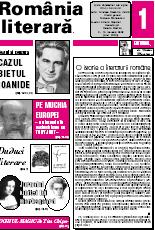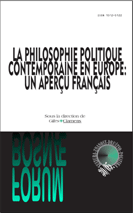
Szexpolitikai testtörténet
A critical review on Thoma Laqueur's "A testet öltött nem [Making Sex]".
More...We kindly inform you that, as long as the subject affiliation of our 300.000+ articles is in progress, you might get unsufficient or no results on your third level or second level search. In this case, please broaden your search criteria.

A critical review on Thoma Laqueur's "A testet öltött nem [Making Sex]".
More...
The study constitutes an application on the journalism field. Analyzing media outlets media operators that existed in the Bals city resulted: a) the existence of an intense journalistic activity in the city Bals starting with the year 1900; b) journalistic activity survived in time and continues to exist up to present. Research concludes that the written media from the city Bals begins to be noticed around the year 1900, it culminates in the inter-war period, through the academician Petre Pandrea who was born here and it had an intense journalistic activity; it is almost inexistent in the communist period and in present, still resist the time through the scholar publications and the people involved in the written media. An important figure of actual written media is Andrei Lupu.
More...
In many countries, ‘free and fair’ parliament elections precede a process of cabinet selection which, in contrast, is often far from transparent. In single party majority rule, the party which wins the election then forms the government, its leader becomes the premier, and he/she then has the power to hire and fire ministers, as it pleases. Where elections result in a number of parties being represented in parliament, none of which has a majority, there invariably follows a very opaque part of the democratic process: inter-party meetings, wherein various parties try to form a majority coalition, with ministries allocated to party functionaries in deals perhaps shady or worse. A third structure relates primarily to conflict zones, all-party power-sharing; in these situations, any negotiations by which a government is formed can be both problematic and protracted. It need not be so. In either a single-party majority rule, a majority or grand coalition, or a unity government, the parliamentary party or parties concerned could use a transparent voting procedure, a tabular mechanism by which every mp can vote, not only for those whom they wish to see in government, but also for each nominee’s ministerial post. It is called a matrix vote. This article will examine different government structures – one-party, two-party and multi-party states; it will examine the assumptions on which democracy is based, with particular regard to the fact that the right of a majority to rule is often interpreted to mean that political decisions can best be resolved by binary votes; it will consider a hypothetical example of the matrix vote; and finally, it will discuss the feasibility of an inclusive, all-party political structure.
More...
In this study, we argue in favor of the thesis that communication as an academic discipline faces many uncertainties. One of these is the uncertainty regarding the status. Some talk about Communication theory, others about the Communication Science, about Communicology, "Sciences de l'Information et de la Communication" (SIC), Communication studies etc. Nuclear question about the status of the communication is: the study of communication is a theory or a science, is a weak cogitative system or a strong cogitative system? We distinguish five causes that determined communication study to remain to this day a weak cogitative system: the effervescence of the theoretical-scientific and practical researches in a knowledge area full of promises; heavy coagulation of a cogitational communication community; refusal of the rule; articulation of communicational thinking as “weak thinking” - “weak thought” G. Vattimo); and the delay in the development of the communication ontology. Discipline that studies communication is a weak-cogitative thinking system, a sum of theories but not yet a science. As a set of weak theories, the study of communication is becoming science. In any case, discipline that studies communication is on the way to become a science.
More...
Itsekiri people came from Egypt after the battle of Actium in 31 B.C. They arrived and settled in the present Warn Kingdom in about 28 B.C in Gborodo, Ureju and Ode Itsekiri. The leaders of the teams were Iset, Iweret and Ipi. The word Oritse which means God in Itsekiri appears to be closer to Osiris, god of the Nile than those of their neighbours - Urhobo, Ijaw and Ilaje. Ra, the god of the sun in Egypt that helps the crops to mature is the wife of Umalokun in Itsekiri, the provider of sea foods. Ife oracle with its 256 literary corpus is a compendium of the cultural practices of the people. It includes the metaphysical and psychic studies of the people, a source of ethics and discipline of the people. It must be sustained to raise the spiritual level of the people. The phenomenological approach was employed by the authors to examine the historical configuration of the Itsekiri social system and the place of Ife oracle. It was concluded that Ife oracle, as compendium of knowledge and reality, is the access point to understanding our human inheritance and realizing our core values. Upon this, it was recommended that Ife oracle is not fetish. Rather it is a valid and reliable source of knowledge.
More...
Among many tribes and nations fiction has a long history as a popular entertainment. The importance of stories is no secret. The meanings of the stories are quite concrete and contacts, events, and eventually finds it earlier. The Persian speakers from early to latet, moral themes, mysticism, religion and other things have taken advantage of this genre. The analogy is meant to provide an example of the eloquence and understanding has long had an important role and are responsible. It is also seen in ancient books and scriptures. Instead, it's like taking the analogy a little word to the land. In this allegory, Masnavi stories and ehya’al oloom are analyzed.
More...
Bhutan is a small, landlocked country in southern Asia, between China and India. Its population is 634,982, and it covers 38,394 square kilometers. It has one of the world's smallest and least developed economies. Agriculture, forestry, and hydroelectric power provide the main sources of income for 90 % of the population. International agencies are currently supporting a number of educational, social, and environmental programs. In 2003, the higher education sector in Bhutan was reorganized through the creation of the Royal University of Bhutan bringing together eight higher education institutes and two teacher education institutions, including the National Institute of Education (NIE) in Samtse, which is in the southern border of Bhutan with India. Recently, the NIE was renamed as Samtse College of Education and the Paro College of Education in the west. The Royal University of Bhutan, founded on 2nd June, 2003 by a royal decree is the national university system of Bhutan. It was established to consolidate the management of tertiary education in Bhutan. It is a decentralized university with 10 constituent colleges spread across the kingdom. The present study focuses the growth and functioning of distance education in Bhutan.
More...
The goal of this study was to search for the factors affecting entrepreneurship of educational management students in Andimeshk Payame Noor University in 2012-2013. That was a survey and the research method was descriptive. The statistic population included 400 full time members of faculties in these universities and 200 participants were selected based on accidental sampling. The tool used in this survey was a questionnaire which included 33 statements. The validity of questionnaire was emphasized and accepted by 10 experts in this field and the reliability of questionnaire was determined based on Chronbach’s Alpha coefficient and the number was 0.93. For the analysis of data, a combination of descriptive and inferential techniques including independent T test and Friedman ranking test was used. Findings indicated by 95 % of assurance the individual, social and economical factors affect on the educational management students' entrepreneurship in order according to the students views.
More...
Reflecting on Judith Butler’s conception of ‘performativity’, this international paper argues that the notion has important implications for contemporary debates over agency, subjection and ‘resistance’ in social work. Using, wider social theory drawn from post-structuralist Butler, makes sense of complex professional-service user relations. The article explores the possibilities and problems for resisting dominant power relationships in micro and meso settings.
More...
The aim of the present research was to compare the psychological well being factors among the parents of the mentally retarded children with those of the normal children. the descriptive research is comparative - causative. The statistical population of the present research includes all the parents of the mentally retarded and normal children whose children were studying in the mentally retarded and normal schools in Mahabad in the educational year of 2012-2013. For this, 80 parents of the mentally retarded children were chosen through the random sampling and 80 parents of the normal children were selected through the multistage random sampling. To collect data m, the Ryff psychological well being questionnaire was used. To analyze data, the multivariate variance analysis statistics was applied. The results of the multivariate variance analysis statistics shows that there is a significant relations with regards to the positive relationship with the others, mastering the environment at the alpha level of 0/01 (P < 0/01), and with regards to the self acceptance factors, independence ,having purpose in life and personal development at the alpha level of 0/05 (P < 0/05). There is a significant difference between the parents of the normal children and those of the mentally retarded children with regards to the psychological well being factors (positive relationship with the others, mastering the environment, self acceptance factors, independence, having purpose in life, and personal development).
More...
The article begins with the slogan of a Romanian TV station "Acasa TV" (Home TV) which says: "Locul tău e acasă" (Your place is at home). The author says that although the message is scandalous, it is in concordance with the traditional clichees that are yet functioning in Romania according to which the women sit at home and raise the children. The author discusses about the telenovelas (the soap operas) that are very popular in a certain segment in Romania and the characters in these telenovelas, as well as about a TV broadcast called "De 3 ori femeie" (Three Times a Woman).
More...
Égalité et liberté sont les termes d’un problème politique récurrent, que le terrain de la différence sexuelle peut reformuler à nouveau. Le recours aux distinctions conceptuelles classiques, avec leur discussion rationnelle, permet d’évoquer le privilège de l’histoire sur la nature.
More...
CEDAW has been a part of Croatian legal system since 1991. Since becoming a party to the CEDAW, Croatia submitted three reports to the Commitee on Discrimination against Women.
More...
Malathi de Alwis presented feminist activism from Sri Lanka, talked about the project "Women in the Zones of Conflict" - a parallel analysis of conditions in Sri Lanka and in the ex-Yugoslav countries, and about the phenomenon of the tsunami, which she compared to war.
More...
From 1969 to 1973 an intensive phase of migration toward Austria took place. The most common were workers from Yugoslavia and Turkey. It is often said and written that woman migrant does not exist. Such a categorisation is institutional an social racist method of marking the Others. Nevertheless, the majority society refers to and relates in its speeches, articles and political contents especially to this, categorized, woman migrant.
More...
In Germany, thousands of Muslim women live under the yoke of patriarchy. They are locked in apartments, helpless against violence and forced marriage. Without a chance of integration, they disappear in parallel worlds reigned by fundamentalist home tyrants. Muslim women are victims of crude male domination, but also of German taboos: foreign religions and cultures are not to be criticized.
More...
Access to and management of mobility are gendered and dependent on institutional context. Mobility as a strategy can be empowering, a resource, a tool for social innovation and agency and important dimension of social capital - if under migrants' own control. But mobility may reflect increased dependencies, proliferation of precarious jobs and, as in the case of trafficking in women, lack of mobility and freedom.
More...
A round table on this topic was organized by Croatian Society of Sociologists in collaboration with the Heinrich Boll Foundation. Not only scientists, but also activists from Slovenian and Croatian women's scene spoke about women's reproductive rights at this meeting.
More...
Contemporary feminist theories reject the idea of law as a neutral system of regulation and dispute resolution, and attack its concepts of "universalism", "objectivity", "neutrality", "rationality". Like Legal Realist theorists, they believe that law cannot be defined as a scientific enterprise devoid of moral or political context, independent of social reality.
More...
In diesem Artikel wird das Themenkomplex Sexismus in der Sprache im Allgemeinen und mit einem besonderen Hinblick auf die nicht-sexistische Sprachkonzeption in der Sprachpolitik der Europäischen Union behandelt. Im einführenden Teil der Arbeit werden die folgenden Grundfragenstellungen beleuchtet: (1) Was bedeutet Sexismus und Sexismus in der Sprache? (2) In welchen kommunikativen /interaktionalen Fällen der Sprachverwendung kann die Sprache als System von Zeichen und der Sprachgebrauch als sexistisch definiert werden? (3) Was ist gegen sprachlichen Sexismus bzw. für nicht-sexistischen Sprachgebrauch zu tun? Im nächsten erörternden Teil der Arbeit werden die aktuellen Richtlinien, Empfehlungen und Konzepte der Europäischen Union und ihre Realisierungsversuche in den EU-Ländern dargestellt, die die sprachliche Gleichstellung sowie sprachliche Gleichbehandlung von Frau und Mann fördern. Im letzten Teil werden die sprachpraktischen Fälle des sprachlichen Sexismus im Ungarischen untersucht, mit einem Ausblick auf die ungarische Rezeption vom sprachlichen Gender Mainstreaming, aus dem Blickwindel der Struktur-Anpassungsprogramme der EU.
More...